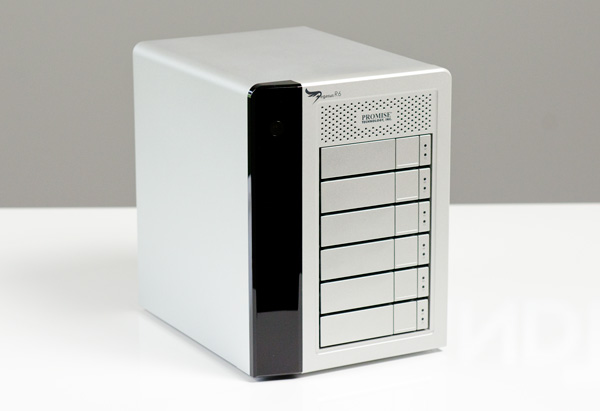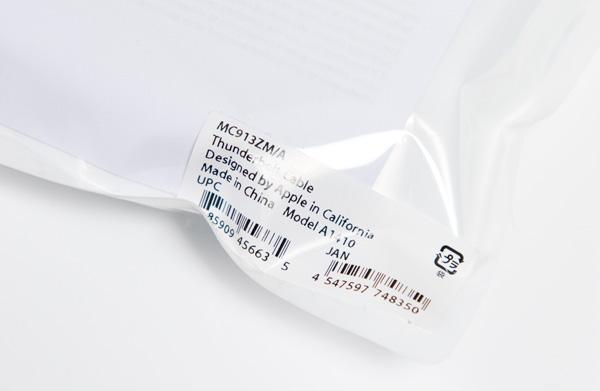Promise Pegasus R6 & Mac Thunderbolt Review
by Anand Lal Shimpi on July 8, 2011 2:01 AM ESTFinal Words
There are really two things that need concluding in this article. We'll start with the Promise Pegasus R6. Without a doubt this is the highest performing external enclosure you can get for your 2011 MacBook Pro or iMac. Even using lowly mechanical hard drives you can get absolutely amazing sequential performance out of the R6. In its beefiest configuration you get 10TB of storage that you can readily access at over 600MB/s. For a MacBook Pro or iMac user that does a lot of HD video work, this amount of high speed storage is just unheard of. The big tower guys have always been able to piece together beefy RAID arrays, but now you're able to get that sort of an experience in a more compact computing device.
I'd love to see Promise offer a version of the Pegasus with SSDs instead of mechanical drives. If Promise didn't want to retool the Pegasus' design it could come in the same chassis, but it'd be really nice to see an even smaller form factor chassis designed exclusively around the 2.5" form factor. I've already shown what four high speed SSDs can do in the R6's chassis. You obviously don't get the capacity but I suspect there's a class of users out there that needs more than what a MacBook Pro can offer with its internal drive bays, but doesn't quite need 10TB of storage.
The Promise Utility that comes with the Pegasus is nice but I found it slightly temperamental at times. I almost feel like we're another couple of software/firmware revisions away from a more polished solution, although admittedly I didn't encounter any issues when I was just using the device as configured.
The biggest drawback to the Pegasus is its price. At $1999 fully loaded, or $999 for an entry level 4TB R4 it's just a very difficult device to justify. I suspect if your work depends on it then you'll have no problems spending the money, but it is a very niche product as a result. I would like to see Promise or someone else offer a barebones Thunderbolt chassis for those users who need this sort of performance but at a better price point. I can understand the price premium for Thunderbolt, but at these prices the technology is simply out of the reach of too many who could honestly use it.
Which brings me to the next topic of discussion: Thunderbolt. The interface is fast, there's no doubt about that. With the right drive configuration I had no problems pushing 8Gbps over the PCIe channel while sending another ~7Gbps over the DisplayPort channel to a 27-inch monitor. It's clear that Thunderbolt has what it takes to really enable more users to migrate from big desktops to high powered quad-core notebooks. The interface effectively solves the high speed local storage issue.
I'd love to see Apple get really aggressive here and offer a Cinema Display with two Thunderbolt ports, more USB ports, Ethernet and audio out. Then MacBook Pro users would only have to run a single Thunderbolt cable + power to their notebooks when they're docked at a desk. I'd also like to see full-speed performance when used in Target Disk Mode. Thunderbolt could become the new defacto way to quickly migrate data between Macs.
I am concerned that we may run into bandwidth limitations in the not too distant future. If we can already push 5 - 8Gbps of data on a single channel, what happens when you run Gigabit Ethernet and USB over Thunderbolt as well. For high end users, I see a definite need for faster signaling or multiple Thunderbolt ports.
I also have concerns about cable costs and widespread adoption. For Thunderbolt to really take off we need to see tons of products that support it. Intel's Thunderbolt controller IC can't be cheap, so I am curious to find out if more companies will give Thunderbolt a try. I believe cable costs can be prohibitive, but today device costs are the bigger concern.
Intel already announced that we'd see Thunderbolt support in Ivy Bridge designs next year so it may be at least one more year before we see just how much market potential Thunderbolt has. While I'm happy that Apple is championing the standard, Thunderbolt really needs widespread industry support to make an impact.












88 Comments
View All Comments
Spazweasel - Friday, July 8, 2011 - link
$50 too much for a cable? Psshh. Children these days don't remember $75-100 SCSI-3 and UltraSCSI cables. These things are expensive for good reason.You want the highest performance, you pay to play. That's always been the case.
tzhu07 - Friday, July 8, 2011 - link
The phrase, "you get what you pay for" is generally true as a rule of thumb, but in the computer and consumer electronics industry, that has for the most part been untrue.Case in point: The high price of Monster cables having no performance advantage over the same type of cables one can find on newegg at a much lower price.
Apple just has this technology cornered....for now.
tzhu07 - Friday, July 8, 2011 - link
Well, I should say untrue in the computer and consumer electronics cable market.darwinosx - Friday, July 8, 2011 - link
The technology is Intel's not Apples. Intel determines the licensing fees.Samus - Friday, July 8, 2011 - link
Yes, but like SCSI, Apple was its only mainstream delivery vehicle. Back in the 80's and 90's, SCSI interfaces were reserved for servers, ultra high end workstations, and Apple computers. They always push the bleeding edge, which is possibly the only thing I respect about Apple.Justin Case - Saturday, July 9, 2011 - link
This has nothing to do with "pushing the bleeding edge". This has to do with giving Apple an "excuse" to remove USB ports from their iToys, thus locking out 3rd party accessory manufacturers (Thunderbolt is far too expensive to be competitive, unless you have a special deal like Apple has with Intel).The Mac hasn't been Apple's main focus for a long time; it's all about iOS and its ecosystem, now.
haley2011 - Sunday, July 10, 2011 - link
okMySchizoBuddy - Sunday, July 10, 2011 - link
doesn't the article specifically say that thunderbolt is free to license.Isn't Promise Pegasus a 3rd part manufacturer. Do you have any source claiming that Promise has a special deal with Apple.
Sony has thunderbolt ports in it's laptop as well.
Focher - Sunday, July 10, 2011 - link
Besides that you give away your bias of anything from Apple, TB isn't an Apple technology. It's an Intel one. What I find ironic is the USB versus TB arguments. First, it's a false choice. Even Apple has offered both FireWire and USB ports for years on their machines. It's only recently that FireWire has started to be removed from models. There's no current indication that USB will be dropped by Apple. Second, in specific regards to USB 3.0 I don't see the argument versus TB device availability. Neither have much market penetration yet, so only time will tell how each of them will do - and both could do fine or both could fail.MobiusStrip - Tuesday, July 12, 2011 - link
iOS devices are toys, but they already lack USB ports. They don't have any proper developer- or user-accessible I/O, so you think Apple's going to put Thunderbolt ports on them?NO. Apple has created a whole line of mobile devices that are ironically isolated from the world around them.